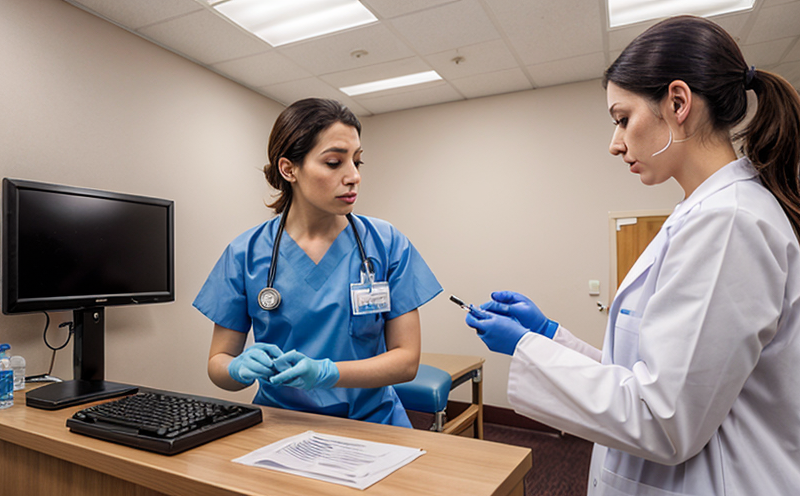Phytotoxin Testing in Plant-Based Animal Feed
The testing of phytotoxins in plant-based animal feed is a critical process to ensure food safety and compliance with international regulations. Phytotoxins are toxic compounds produced by plants, which can pose significant risks if present in high concentrations in animal feed. These toxins can cause various health issues for both animals and humans consuming the meat or dairy products derived from them.
The primary goal of phytotoxin testing is to identify and quantify harmful substances such as mycotoxins (produced by molds), alkaloids, cyanogenic glycosides, and other naturally occurring toxins. Given the variability in plant species and growing conditions, it's essential to conduct thorough analysis using validated methods that are sensitive enough to detect even trace amounts of these compounds.
Our testing services leverage cutting-edge technology and internationally recognized standards like ISO 13725:2012 and EN 14698-2:2009. These standards provide guidelines for the analysis of mycotoxins in feedstuffs, ensuring consistency and reliability across different laboratories worldwide. Our team of experts ensures that all tests are conducted according to these stringent protocols.
The testing process typically involves sample preparation, extraction, purification, and detection using advanced analytical techniques such as liquid chromatography-tandem mass spectrometry (LC-MS/MS) or gas chromatography-mass spectrometry (GC-MS). The results are then reported in units relevant to the specific toxin being tested, often expressed as parts per billion (ppb).
By offering this service, we help our clients maintain regulatory compliance and protect their reputation by ensuring that their products meet stringent quality standards. Whether you're a large-scale producer looking to safeguard your supply chain or an R&D engineer aiming to innovate safer feeds, our expertise can be invaluable.
- We adhere strictly to international standards such as ISO 13725:2012 and EN 14698-2:2009.
- Our team uses state-of-the-art LC-MS/MS and GC-MS instruments for precise analysis.
The scope of phytotoxin testing in plant-based animal feed encompasses a wide range of potential toxins that could affect the safety and quality of feeds. This includes mycotoxins, which are produced by fungi during the growth or storage phases of crops; alkaloids like solanine found in potatoes; cyanogenic glycosides present in cassava; and other naturally occurring compounds known to be harmful.
The methodology for conducting these tests is rigorous and involves several key steps. Initially, samples are collected from various stages of production—raw materials, processing intermediates, finished products—to ensure comprehensive coverage. Each sample undergoes thorough preparation, including cleaning, grinding, and homogenization, followed by extraction using solvents appropriate for the type of toxin being targeted.
Once extracted, the toxins are purified to remove interferences and then analyzed using sophisticated instrumentation. For mycotoxins, liquid chromatography-tandem mass spectrometry (LC-MS/MS) is commonly employed due to its high sensitivity and specificity. Other techniques such as gas chromatography-mass spectrometry (GC-MS), immunoaffinity column cleanup, and enzyme-linked immunosorbent assays (ELISAs) may also be used depending on the specific toxin.
The final step in this process is reporting the results. These reports provide detailed information about the presence and concentration of each identified phytotoxin, along with recommendations for corrective actions if necessary. Compliance with regulatory limits set by organizations like the European Commission or the United States Food and Drug Administration (FDA) is ensured through accurate and reliable testing.
International Acceptance and Recognition
The importance of phytotoxin testing in plant-based animal feed cannot be overstated, especially given its international dimension. Many countries have stringent regulations regarding the presence of certain phytotoxins in food products to protect public health. Ensuring compliance with these regulations not only helps prevent legal issues but also builds trust among consumers and regulatory bodies.
- Regulatory Compliance: Countries like the European Union, United States, China, and others have established maximum allowable levels for various phytotoxins in animal feed. Our testing services ensure that your products meet these standards by providing accurate quantification of each toxin detected.
- Market Access: Achieving certification from recognized bodies such as the Codex Alimentarius Commission or the European Food Safety Authority can significantly enhance market access for your products. By offering compliant results, we facilitate easier entry into international markets.
In addition to regulatory compliance and market access, our service also contributes to broader industry recognition and reputation building. When clients choose us for their phytotoxin testing needs, they are investing in a partner that understands the complexities of global food safety requirements. This commitment translates into increased confidence from buyers and stakeholders alike.
Competitive Advantage and Market Impact
Phytotoxin testing plays a crucial role in maintaining competitive advantage within the agricultural sector, particularly for those involved in producing plant-based animal feed. By ensuring that your products are free from harmful contaminants, you demonstrate a strong commitment to quality and safety—a key differentiator in today's competitive market.
- Enhanced Reputation: A reputation built on delivering safe and reliable products can attract more customers and build long-term relationships with stakeholders. This enhanced image is particularly valuable in sectors where consumer trust is paramount, such as organic farming or niche markets targeting health-conscious consumers.
- Innovation Support: Our testing services provide invaluable insights into potential areas for improvement within your production processes. By identifying sources of contamination early on, you can implement targeted strategies to eliminate them entirely, fostering continuous improvement and innovation.
The impact extends beyond individual businesses; it contributes positively towards the overall health and sustainability of agricultural practices globally. With increasing emphasis placed on sustainable farming methods that minimize environmental harm while maximizing yields, ensuring feed safety through rigorous testing becomes an essential part of this broader goal.





